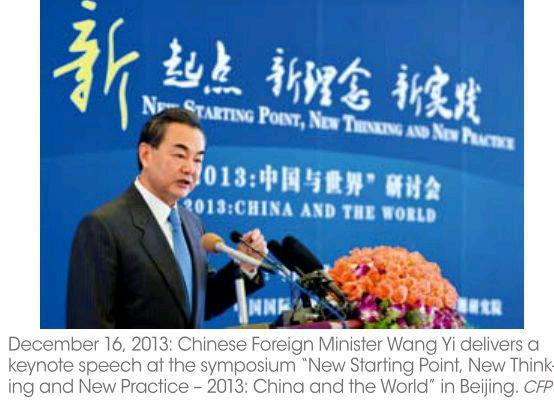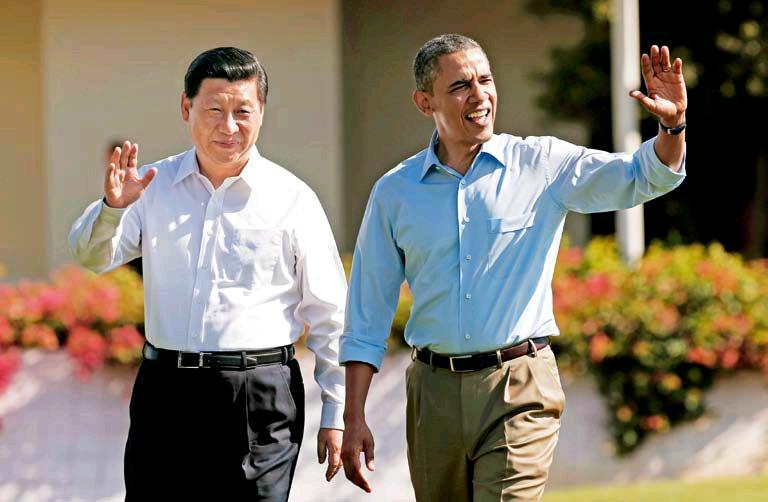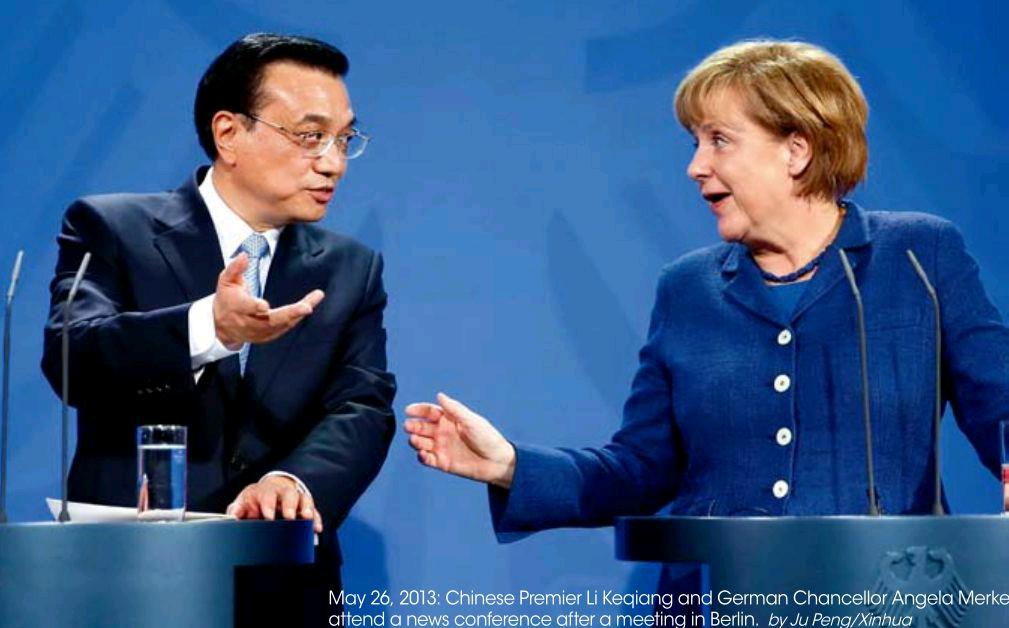Diplomatic Boom
2014-02-24

On December 16, 2013, the symposium “New Starting Point, New Thinking and New Practice – 2013: China and the World” was held in Beijing. In his keynote speech at the symposium, Chinese Foreign Minister Wang Yi declared 2013 an extraordinary year for Chinas diplomacy, when the country implemented diplomatic strategies around the world with broader vision and a more enterprising spirit. He also predicted the countrys diplomacy to witness comprehensive advancement in 2014, and expects “more exciting achievements in the year to come.”
Six Major Achievements of 2013
Firstly, the strategic partnership between China and Russia reached a new level. In March 2013, after he was elected Chinese President, Xi Jinping, General Secretary of the Central Commit-tee of the Communist Party of China (CPC), chose Russia as his first overseas visit as president. The Chinese and Russian presidents signed a joint statement, in which both countries explicitly committed to staunchly supporting each others development and revitalization, right to independently choose developmental paths and socio-political systems, and stances and actions to safeguard core interests such as sovereignty, territorial integrity and security. The two countries set a good example for mutual trust and cooperation between great powers. Moreover, China and Russia signed many cooperative agreements, evidencing the strategic importance and singularity of Sino-Russian relations. Since March 2013, state heads of the two countries have met five times, pushing bilateral cooperation in economics, energy, culture, military and other areas to new heights. International strategic coordination and cooperation between the two have reached unprecedented intimacy.
Secondly, China and the United States have entered a new era of jointly establishing a new type of relationship between big powers. From a historical perspective, it seems inevitable for major countries, especially an emerging power and an established one, to engage in competition and even eventually slip into conflict. However, against the backdrop of growing globalization in the 21st Century, China is committed to avoiding repeats of historys mistakes and confident in breaking the cycle by working together with the United States.
Thirdly, the new government of China has attached greater importance to neighborhood relations in its overall diplomatic agenda. Both Chinese President Xi Jinping and Premier Li Keqiang visited neighboring countries soon after inauguration. They met heads of state and government of 21 neighboring countries, making extensive high-level contact. Over the past year, China has proposed a number of major cooperative initiatives, enhanced practical cooperation with its neighbors, and deepened mutual political trust in the neighborhood by treating every entity with sincerity. In October 2013, China held its first conference on neighborhood diplomacy since 1949, which set out strategic objectives, basic principles and overall plan for regional diplomacy in the next five to 10 years, opening up even greater prospects for regional cooperation.
Fourthly, unity and cooperation between China and other developing countries have entered a new phase. In 2013, President Xi Jinping visited Tanzania and two other African countries, met with more than 10 African leaders, announced an array of new measures supporting Africas development, and signed over 40 cooperative agreements, including launching major projects that will boost their development and improve their residents wellbeing.When he visited three Latin American countries including Mexico, President Xi signed 24 cooperative documents, held bilateral talks with leaders from eight Caribbean countries, and announced a set of new measures supporting economic and social development.
Fifthly, as a permanent member of the United Nations Security Council, China has focused on its international responsibilities and obligations and taken an active part in addressing major regional and international issues over the past year. At crucial moments of both the Syria conflict and Iranian nuclear talks, China has resolutely safeguarded the basic norms governing international relations, upheld equity and justice, and opposed war and power politics. It has played a positive role in bringing the Syrian issue back to a political resolution and drafting an agreement between P5+1 and Iran. China has also worked with other parties to ease tensions on the Korean Peninsula, actively push for resumption of the Six-Party Talks, and support peace and reconstruction in Afghanistan, thus playing a vital role in maintaining regional peace and stability. China has actively participated in drafting the post-2015 development agenda, and offered proposals and concessions to solve climate change and other pressing global issues.
Sixthly, China has achieved progress in upholding its national interests. Over the past year, we have effectively thwarted illegal acts of countries attempting to encroach on Chinas territorial sovereignty and maritime rights and interests. We insist that relevant issues need to be resolved properly through dialogue and negotiation on the basis of fully respecting historical context and international law. China and ASEAN countries have launched consultation on a code of conduct in the South China Sea within the framework of implementing the Declaration on the Conduct of Parties in the South China Sea. China has reached an agreement with Brunei and Vietnam to promote joint development and maritime cooperation. All of these factors have contributed to the peace and stability in the South China Sea.

Five Major Focuses of 2014
We will strengthen high-level exchange, deepen strategic mutual trust, increase converging interests, and promote sustained, stable and sound growth of bilateral relations with major coun-tries. We will go further in building a new model of major-country relationship between China and the United States and give more substance to this relationship by making our cooperation more productive. We will expand practical cooperation across the board and intensify international strategic coordination with Russia to ensure that Sino-Russian relations will always operate on the highest level. We will implement the China-EU 2020 Strategic Agenda for Cooperation and find more avenues for our respective development strategies to thrive. We will enhance our relations with major developing countries and strengthen coordination and cooperation on important regional and international issues.
We will push for good neighbor behavior and friendship, enhance mutually beneficial cooperation and build a closely-knit community of shared destinies with neighboring countries. We will stick to the goal of denuclearization of the Korean Peninsula and promote the resumption of the Six-Party Talks. We will firmly uphold Chinas sovereignty and dignity and resolve disputes over territories and maritime rights and interests with neighbors through dialogue and negotiation. We will optimally host the 4th Ministerial Conference of the Istanbul Process in an effort to promote political reconciliation and economic reconstruction in Afghanistan.
We will work harder to deepen traditional friendship with other developing countries. We will expand practical cooperation with Africa in various fields, implement measures of assistance to Africa and make new breakthroughs in Sino-African trade and economic cooperation. As host, we will ensure the success of the 6th Ministerial Conference of the China-Arab States Cooperation Forum and work out new measures for cooperation between China and Arab states. We will promote the establishment of a cooperative forum between China and Latin America to inject vigor and vitality into Chinas overall cooperation with this region.
We will accelerate economic diplomacy to facilitate efforts to comprehensively deepen reform at home. We will vigorously promote the development of the economic belt along the Silk Road and the maritime Silk Road for the 21st Century and endeavor to achieve an “early harvest” on those initiatives. We will accelerate the implementation of the free trade area (FTA) strategy both bilaterally and multilaterally, work with relevant countries for the early conclusion of negotiations on the China-ROK (Republic of Korea) and China-Australia FTAs, make substantive progress in negotiating an upgraded version of the China-ASEAN FTA and the Regional Comprehensive Economic Partnership and continue to advance negotiations on China-Japan-ROK FTA. We are open to the Trans-Pacific Partnership and other regional and trans-regional free trade initiatives. And we encourage inclusiveness of all parties to work jointly for mutual progress.
We will take the Summit of the Conference on Interaction and Confidence-Building Measures in Asia and the APEC Economic Leaders Meeting that China will host in 2014 as opportunities to promote security cooperation and economic development. We will also try to make Chinas voice heard, present Chinas goals and play a positive role in the proper settlement of the Syrian issue, the Iranian nuclear issue and other regional and international hotspot issues.
